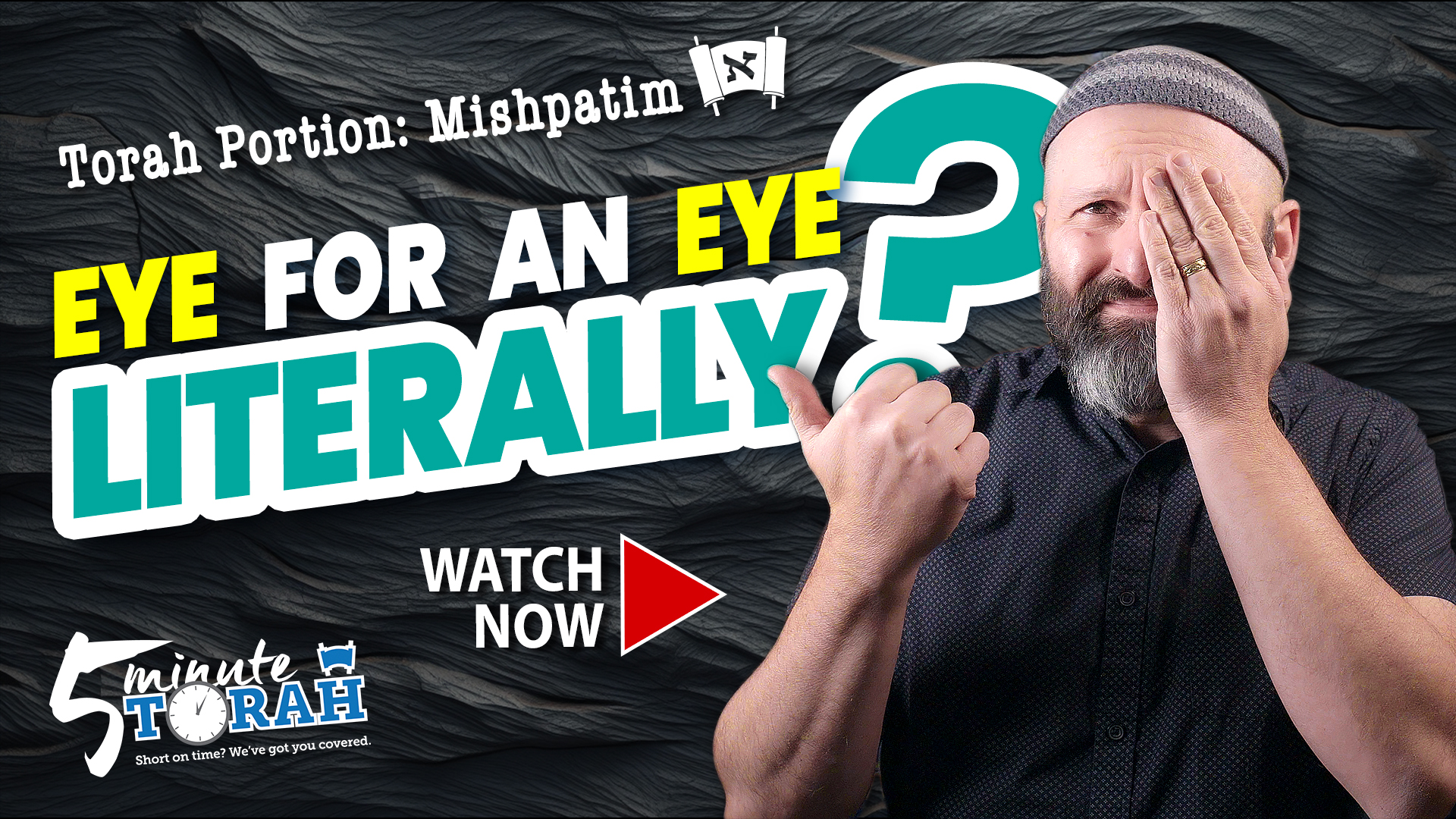An Eye For An Eye. Literally?
Series:

Parashat Mishpatim (Exodus 21:1-24:18)
Upon a cursory reading of the Torah some of the laws contained within it seem not only a bit harsh, but even barbaric at times. This week’s Torah portion contains laws that seem to fall into that category and tend to make the modern reader uncomfortable. One of the passages is related to personal damages caused by physical violence:
You shall pay life for life, eye for eye, tooth for tooth, hand for hand, foot for foot, burn for burn, wound for wound, stripe for stripe. (Exodus 21:25)
It would seem that from this passage that the Torah condones an extreme and retaliatory brand of justice. If two people get in a fight and one gouges out the other’s eye, then the offender is to have his eye also gouged out as repayment for the offense. This passage is often used to contrast the harsh justice of the Torah to Yeshua’s message of grace and mercy:
You have heard that it was said, ‘An eye for an eye and a tooth for a tooth.’ But I say to you, Do not resist the one who is evil. But if anyone slaps you on the right cheek, turn to him the other also. (Matthew 5:38-39)
From this passage, it appears that Yeshua is telling his disciples that the Torah prescribed a one method of dealing with offenses, but he is now prescribing a different one. Where the Torah endorsed strict, retaliatory justice, Yeshua endorses mercy and grace. But is this really what Yeshua is teaching his disciples? Was the Torah’s instruction of “an eye for an eye” taken literally in Yeshua’s day?
The Talmud, although compiled centuries after the time of Yeshua, records how this principle has always been understood and practiced within Judaism. It says that a person should not entertain the thought that the biblical expression, “eye for an eye,” is to be taken literally. The Talmud makes it clear that retaliatory justice was never imagined by the Torah. Rather than literally gouging out the eye of an offender, the courts would evaluate the value of the eye of the victim and order compensation for the amount determined (see b.Bava Kamma 83b).
The Torah itself also makes this clear. The passage we began our discussion with actually spells this out in the previous verse, before mentioning the expression, “eye for an eye.” It says:
When men strive together and hit a pregnant woman, so that her children come out, but there is no harm, the one who hit her shall surely be fined, as the woman's husband shall impose on him, and he shall pay as the judges determine. (Exodus 21:22)
The Mishnah, the authoritative and definitive code of Jewish law, describes these criteria the courts would use for determining the value of an “eye” or “tooth” or any other injury sustained by the victim:
One who injures another is liable to pay compensation for that injury due to five types of indemnity: He must pay for damage, for pain, for medical costs, for loss of livelihood, and for humiliation. (m.Bava Kamma 8:1)
So, when Yeshua makes the statement, “You have heard that it was said: An eye for an eye and a tooth for a tooth,” what is he trying to say? Is Yeshua overriding the Torah? Not at all. As we have noted, the Torah makes provision for repayment of damages. These laws served a two-fold purpose. First, they were for the protection of those who incur damages at the hands of others. Most importantly, however, they were for the person who was liable for the damages (the offender), to take personal responsibility for the harm of others. These laws were never created for retaliation from the one incurring damages (the victim). The Torah’s legislation addresses the offender. It instructs them how they should attempt to compensate for the damages they have caused, giving the court a basis of value by which it can define the compensation.
What Yeshua does, on the other hand, is address the victim. By saying, “If anyone slaps you on the right cheek, turn to him the other also,” he specifically addresses the response of the victim, rather than the responsibility of the offender, who has already been addressed by the Torah. He makes it clear that when we are wronged—when we incur damages—we are not to demand restitution. We are to treat others with the same mercy which we would desire to receive if the tables were reversed. The Torah addresses the offender, while Yeshua addresses the victim. Yeshua upholds Torah completely, and instructs us on how to live beyond the letter of the Law to the greater spirit of holiness that the Torah embodies. It would honor our Master if we remembered this principle the next time someone wrongs us and we are tempted to demand our full legal rights.








